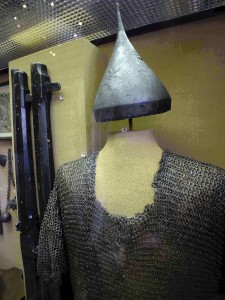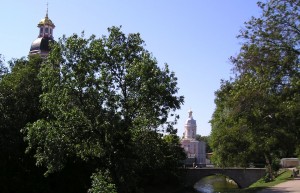Icon of St. Alexander Nevsky. Although canonised in the mid 16th century, Nevsky’s relics inspired Russian forces at the Battle of Kulikovo in 1380 commanded by Dmitry Donskoi, Prince of Moscow.
It must have been with a sense of irony that Peter the Great founded St. Petersburg as a “Window to the West” on the banks of the Neva River, as nearly 500 years before, it was here that Alexander Yaroslavich Nevsky had won a battle which signalled Russia’s turning away from Europe and looking to the east.
Alexander Yaroslavich (1220-1263) is one of Russia’s revered figures, who had a lasting impact on the development of Russia and Russia’s culture. The holiest place in St. Petersburg is St. Alexander Nevsky Monastery, while Nevsky Prospekt and the Neva River itself (from which he took his name) are constant reminders of this Russian hero, in Russia’s most European city.
Alexander Yaroslavich was born in one of Russia’s most turbulent periods, during the time of the Mongol Invasions with the first tentative invasion of Russian territory made in 1223 and a more persistent invasion made from 1235-41. Despite the threat posed by the Golden Horde, Alexander Nevsky came to fame not for fighting the Mongols, but the threat from the West.
In 1236 he was invited by the Novgorod Veche to become Prince of Novgorod. Novgorod was a wealthy, and consequently independent trading city which elected its military leaders as required to protect it from its enemies which included not only the Mongols, but other Russian cities and the Teutonic Knights. During the reign of Pope Gregory IV (Pope 1227-41) the Roman Catholic Church and other religious orders began to look to North Eastern Europe – much of which was still pagan, or Orthodox, resulting in a number of invasions of Rus territory by the Teutonic Knights. In the late 1230s the young prince was involved in a series of wars including a campaign to retake Smolensk from the Livonian Order.

Replica of chainmail hauberk that would have been worn by Alexander Nevsky, held at the National Historical Museum in Moscow
In 1240, a combined force of Germans and Swedes invaded Rus with the intention of establishing an outpost on Lake Ladoga which would give them access to one of the key trade routes of the period. Alexander Yaroslavich who was 19 at the time, took what forces he had with him, and refusing to wait for reinforcements marched to meet the enemy. He secretly approached the Swedish camp at the confluence of the Izhora and Neva rivers at about 11 a.m. on July 15. Few details are known about the battle, however, the battle concluded with a victory for Russian forces and increased the prince’s status throughout Rus but led to him falling out of favour with the Novgorod nobility that same year. He went into voluntary exile until being recalled to protect Novgorod from another invasion.
Returning in spring 1241, Alexander Yaroslavich raised an army and fought a campaign against Livonian Order of the Teutonic Knights and in early 1242 liberated Pskov. The campaign was concluded with the famous Battle on the Ice on April 5, 1242, in which Yaroslavich foot infantry succeeded in repulsing cavalry attacks made by the knights before eventually driving the knights into the centre of the lake, where the weight of their horses and armour cracked the ice and destroyed the invading army. The victory on Lake Peipus (also known as Chudskoe Lake) has had lasting repercussions. To this day the Narva river which flows from the lake is considered the Russian border with Estonia.
Throughout his life Alexander Yaroslavich fought several campaigns against the Livonian Order. However, it is for his defence of the Orthodox faith and his refusal to accept conversion to Catholicism that he is particularly venerated. His conflicts with the Livonian Order forced him to make peace with the Golden Horde and he became a vassal to the Mongols. Throughout his life he made five trips to Sarai and Karakorum. By paying tribute he protected his territories from further invasions, and protected Russian culture and Orthodoxy. Furthermore, he achieved an exemption for the Rus from serving in the Mongol armies. However, as a vassal, he was involved in repressing the Russian’s himself, including suppressing a revolt by Novgorod in 1259.
He died in Vladimir in 1263, shortly after returning from Sarai where he achieved the exception from military service. As both a warrior and a diplomat, Alexander Yaroslavich had a lasting impact on Russia’s history, and because of his successful defence of Russian lands against European invaders, he has been used throughout the ages for propaganda, most notably during World War II. Alexander Nevsky was canonised in the 16th century and it was then that Nevsky was added to his name. His relics are held at the St. Alexander Nevsky Monastery in St. Petersburg, located at where it was once thought the Battle of the Neva was fought.
This is an extended article of an article published by The St. Petersburg Times on 4 June 2014.
Be sure to like Intrepid Adventure on Facebook and check out Peter Campbell’s latest books on Amazon.com.
Copyright © Peter Campbell 2014, www.intrepid-adventure.com




